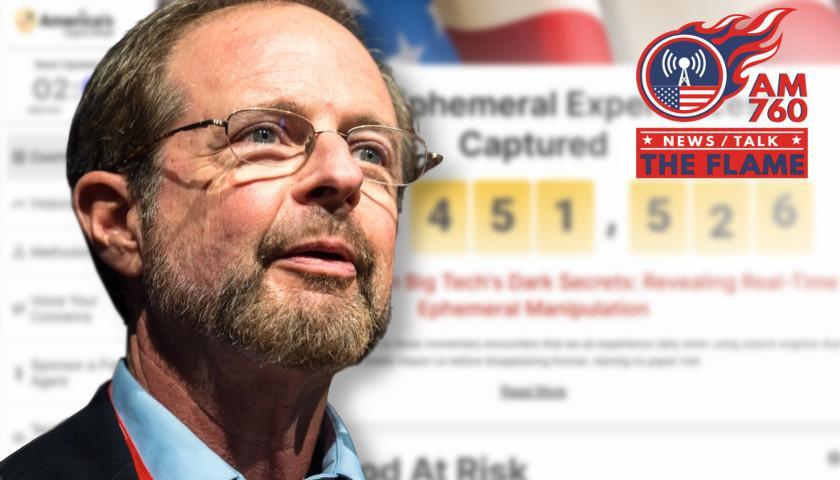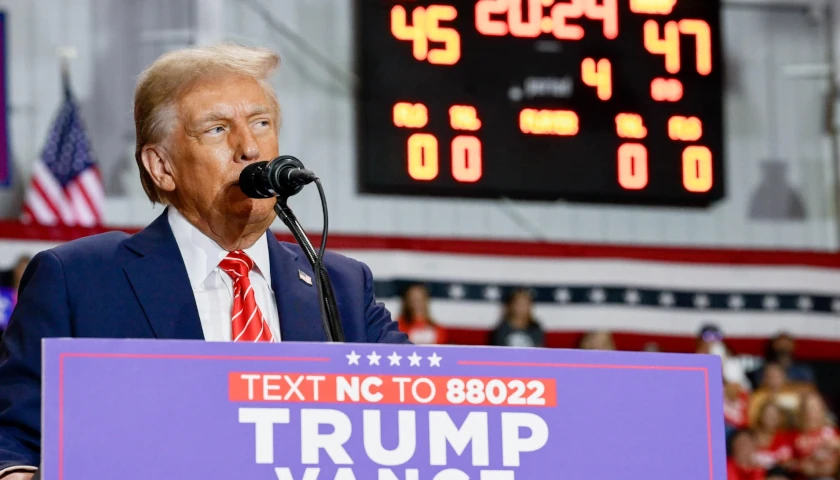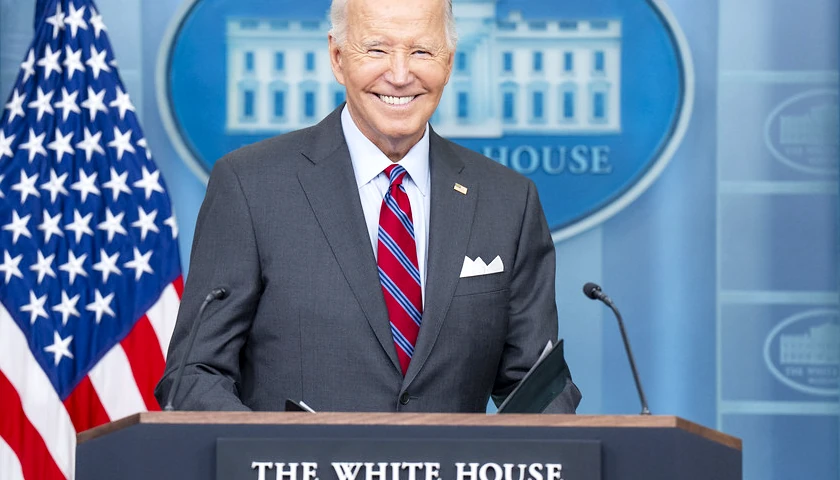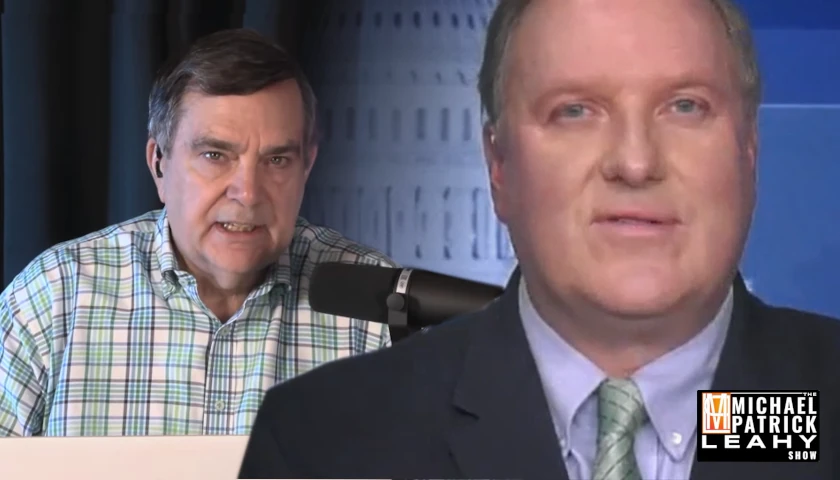Dr. Robert Epstein, founder and director emeritus of the Cambridge Center for Behavioral Studies joined Monday’s episode of The Tennessee Star Report with Michael Patrick Leahy and revealed the shocking truth about how Google manipulates search engines to change voting behavior.
Dr. Epstein, an expert in psychology, shares his extensive research on the subject and exposes the impact of Google’s control over” ephemeral content.” With the ability to shift millions of votes, Google poses a significant threat to the integrity of elections. However, Dr. Epstein offers a solution to stop their manipulations and reveals how his pioneering system, AmericasDigitalShield.com, is poised to protect the 2024 election. Join us as we delve into this eye-opening conversation and uncover the truth behind Google’s influence on our democracy.
TRANSCRIPT
Michael Patrick Leahy: 12:20 PM; broadcasting live from our studios in downtown Nashville.
Original All Star panelist Crom Carmichael in-studio with us; on the newspaper line right now. Dr. Robert Epstein, Ph.D. in psychology; also an expert on how Google manipulates search engines to change voting outcome.
Welcome Dr. Epstein. Thanks for joining us today.
Robert Epstein: Sure. It’s my pleasure.
Michael Patrick Leahy: Now, you’re the founder and director emeritus of the Cambridge Center for Behavioral Studies in Massachusetts.
I’m gonna tell you a story.
So BF Skinner, author of On Walden Pond.
Robert Epstein: Walden Two.
Michael Patrick Leahy: Walden Two, yes. He was your PhD advisor, correct?
Robert Epstein: Correct. I was his last doctoral student.
Michael Patrick Leahy: Well, I met Dr. B. F. Skinner, wait for this, when I was a freshman at Harvard.
Our big deal was we organized a group to host a lunch with B. F. Skinner and he came and talked to us, and we recorded that lunch and did a whole paper on it. So, a fascinating, fascinating fellow.
Robert Epstein: Absolutely.
Michael Patrick Leahy: And so he obviously had a significant impact on your career.
Robert Epstein: That’s an understatement, yes.
Michael Patrick Leahy: You’ve had quite an interesting academic background. Tell us a little bit about your current research on how Google manipulates search engines to change voting behavior.
Robert Epstein: Sure. Well, it’s not just their search engine.
It’s they’re using all kinds of tools. They’re using YouTube, for example, which is owned by Google, and they have control over those “up next” videos and all those recommendations.
And all of this kind of content, like “up next” videos search results, search suggestions, answer boxes, all that kind of stuff that Google controls is all ephemeral – meaning it’s fleeting, it affects people, then it poof, goes up in a puff of smoke, disappears forever, and is stored nowhere.
So they use ephemeral content to shift people’s thinking and behavior, especially in elections, and I know there’s a lot of focus among my conservative friends looking at voter fraud, but this is the Big Game, because voter fraud can shift a few thousand votes here and there, but Google is shifting millions of votes.
So if we don’t stop them next year, Google alone has the ability to shift between 6.4 and 25.5 million votes in the presidential election. Fortunately, I know how to stop them.
Michael Patrick Leahy: Well, let’s ask this–
Crom Carmichael: How do you stop them?
Michael Patrick Leahy: Crom wants to know how you stop them. Please tell us, tell us.
Robert Epstein: Well, I can tell you what won’t work. What won’t work is trying to count on our public officials, members of Congress, and so on.
That will not work because tech moves lightning-fast and law and regulation moves so slowly. And of course, Washington, where I was testifying before Congress last week, is so dysfunctional that will not work. Nothing’s going to happen there.
But what I’ve learned over the years is how to capture ephemeral content, which remember by definition is normally lost. That’s why they use it to manipulate.
2018, there was a leak of Google emails to the Wall Street Journal in which Google employees were saying, how can we use ephemeral content to change people’s views about Trump’s travel ban?
So this is real – I mean, we know it from leaks from the company, from whistleblowers.
They’re doing this on a massive scale. One of the things they do, for example. election is they put partisan register-to-vote reminders on their homepage, partisan mail-in-your-ballot reminders, partisan go-vote reminders. And we are now capturing all of this ephemeral content.
So when I testified before Congress last week, I was allowed – it was amazing; they made an exception – they let me introduce AmericasDigitalShield.com. We actually displayed it on big screens in front of this congressional committee.
AmericasDigitalShield.com which people can go to right now. This is unprecedented. This is extremely advanced tech that we spent $3 million to build over the past year.
And what you’re seeing on that page is in realtime, we are preserving, collecting ephemeral content through the computers of a politically balanced group of more than 13,000 registered voters in all 50 states. So this is real ephemeral content being sent to people’s eyes by Google and other companies, and we’re capturing it.
We are Google’s worst nightmare. And what you see on that page is we’re not only capturing it, we’re analyzing it with lightning-fast speed, and what we’re finding is extreme political bias sufficient to flip many elections. And if you scroll down to the bottom, you’ll actually see a list of some of the elections Google has flipped.
So we’ve figured this stuff out, and by taking this system that we’ve built, expanding it so that we have court-admissible data in all 50 states, we will stop them. They will stop these manipulations and they’ll stop indoctrinating our children.
Crom Carmichael: How do you get to stop them in court? I thought they were covered by Section 230.
Robert Epstein: Well, this is different though, because if you have a lot of data and you can show that they’re actually violating certain laws – like there is a federal election act which they violate when they are showing people partisan go-vote reminders.
There’s also campaign finance law, which they’re violating because they’re basically making huge secret donations to political parties and candidates without, without declaring that, which is illegal, too.
So, I’m working with A.G.’s around the country. I’m working with members of Congress.
They’re all desperately waiting for this data, because if you have the data, you can pressure them with advocacy groups, parenting groups, election integrity groups. You can, you can file complaints with federal agencies and you can go to court if you have the data.
Last year the RNC sued Google because Google was shifting tens of millions of emails that the RNC was sending to Republicans.
They were shifting the emails into people’s spam boxes. So the RNC ran to court. They had no actual data. The case got thrown out. But see, we’re collecting the data. We’re preserving this stuff, which normally is lost forever. That’s why it’s called ephemeral.
Michael Patrick Leahy: When will you have data sufficient to go to court?
Robert Epstein: Well, we’re, we have sufficient data now in 15 of the 50 states.
Michael Patrick Leahy: Is Tennessee one of those states?
Robert Epstein: Tennessee is not one of those states.
But we have people in Tennessee; we are monitoring in Tennessee, but that’s the whole point. We have to expand the system that we built, which cost $3 million to build.
We have to expand it, and we have to make it permanent and self-sustaining, and then these companies will just pull back.
Michael Patrick Leahy: When will the first lawsuit be filed, and where will it be filed?
Robert Epstein: Well, I’m not going to say. The first thing is actually going to be a complaint to the Federal Election Commission, which we’ve been working on with a very prominent law firm in D.C., with a lawyer who used to work for the Federal Election Commission.
That’ll be the first thing. But the main thing is, it is not so much to catch them and run to court. Okay, that’s going to happen, but that’s not the main purpose of setting up a permanent monitoring system. It’s to stop them.
Michael Patrick Leahy: Stop them from doing this.
Robert Epstein: And we’ll see when they stop because we saw this happen in 2020 when we shared some of our data with Senator Ted Cruz.
On November 5th, 2020, right after the election, Cruz, Mike Lee, and Ron Johnson, whom I’m in regular contact with, they sent a very threatening letter to the CEO of Google.
If you go to lettertogoogleceo.com. You’ll actually see the letter that they sent lettertogoogleceo.com and they sent a, they sent a threatening letter saying, you know, here’s Epstein’s data. How do you account for this? November 5th, 2020. They stopped their manipulations in Georgia, which was gearing up for those two Senate runoff elections.
They stopped. And how do I know? Because we were monitoring through the computers of more than 1000 registered voters throughout Georgia. We saw them just literally stop.
Michael Patrick Leahy: Last question for Dr. Robert Epstein.
Crom Carmichael: What is your website?
Michael Patrick Leahy: I’m going to get to that right now. Last question for you. When will AmericasDigitalShield.com be able to take enough action to help 2024 election not be cheating. We got 20 seconds.
Robert Epstein: We probably have enough now, but the problem is we’ve run out of money, so I need people to support us. Go to AmericasDigitalShield.com. We only pay our field agents $25 a month, but we need tens of thousands.
Michael Patrick Leahy: Dr. Robert Epstein, AmericasDigitalShield.com. Thanks so much for joining us today.
Robert Epstein: Absolutely. Thank you.
– – –
Listen to The Tennessee Star Report with Michael Patrick Leahy weekdays from 11:00 am to 1:00 pm on WENO AM760 The Flame.
Photo “Dr. Robert Epstein” by Dr. Robert Epstein.




